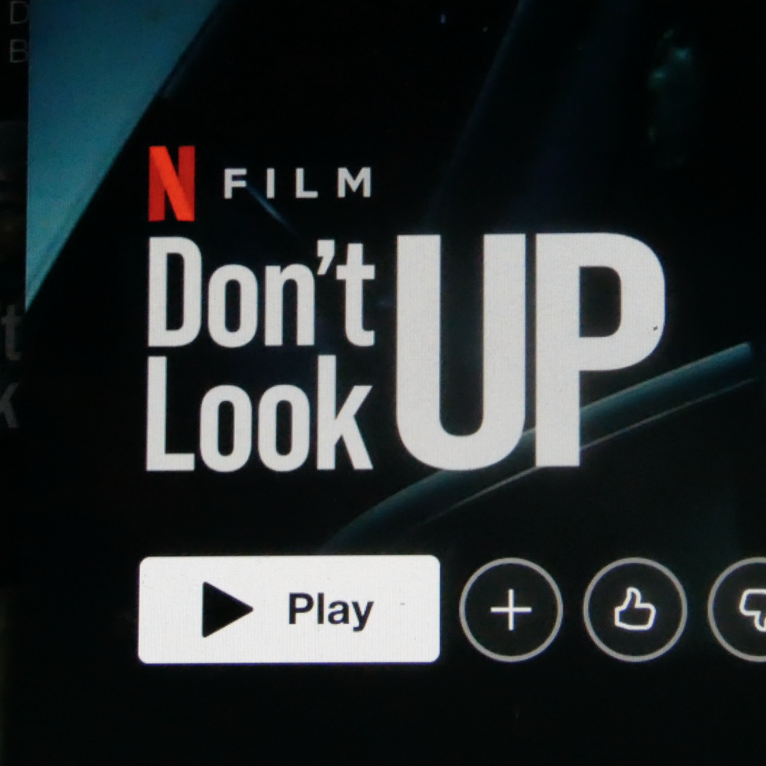
Don’t Look Up is turning heads
How the 2021 Netflix film tackles climate change and fake news
The trending Netflix movie Don’t Look Up, directed by Adam McKay, is undeniably an allegory or satire of our current climate crisis and how society is dealing with it. Spoiler alert: not well.
Although the title implies that we should keep our heads down, the film itself demands that we look up at our impending doom and do something about it.
So, what’s it about? (Spoiler alert)
In Don’t Look Up, PhD candidate Kate Dibiasky, played by Jennifer Lawrence, spots a huge comet hurtling towards Earth. Dr. Randall Mindy, played by Leonardo DiCaprio, calculates that the planet has six months and fourteen days before it’s destroyed.
They fight to warn the planet of its impending doom until the President of the United States finally agrees to take action. However, the government aborts their mission to deflect the trajectory of the comet so that Peter Isherwell, a supremely wealthy businessman played by Mark Rylance, , can mine it for valuable minerals. His plan fails, and the planet is destroyed.
Nothing could better represent how the insatiable greed of the rich can lead to the death of all.
The movie’s mixed response
In emails to the Dalhousie Gazette, two students and a professor in the English department at Dalhousie University shared their thoughts on the movie. As they pointed out, it received mixed reviews — people seem to either love it or hate it — but all three of them enjoyed and would recommend watching the film.
“It had an interesting mix of humour, dystopia, and a sense of crisis or anxiety,” writes Emmy Sharples, a fourth-year honours student in English and psychology.
Maya Schwartz, a fourth-year honours student in English and contemporary studies, writes, “The movie did a really good job of not only appealing to a wide audience, but also reflecting different aspects of being alive at this time.”
Jason Haslam is a Dalhousie English professor who teaches a Climate Fiction course.
“[The divided response to the movie] is a sign of a piece of cultural work that can lead to all forms of important discussion,” he writes. Haslam’s research interests involve popular culture and projects in speculative fiction and film.
The film as an allegory
The comet, although a more immediate apocalyptic event, is a clear allegory of climate change. Both have the same result: an end to life on Earth. But, as Haslam points out, the movie is more centred on “how culture and society (art, politics, media, etc.) represent and mobilize around global social issues like climate change.”
“The film works equally well as a critique of pandemic response, for instance,” he writes.
Some accuse the movie of being too on-the-nose with its message.
“It’s as heavy-handed and on-the-nose as an attack ad from the opposition,” Canadian film critic Rachel Ho says in her exclaim.ca review.
“I think the movie was meant to be in your face,” Schwartz writes. “I think it really wanted the audience to realize right away what was happening and think: oh god, this is us.”
Indeed, the satire is hard to miss. Sharples writes that “the constant ignoring of life-changing issues for profit or political means was very concerning as it felt a little too close to home.”
To put it in the words of President Orlean, played by Meryl Streep, those in power often choose to “sit tight and assess” the threatening situation as opposed to taking action before it’s too late. A major motive behind this decision, in most cases, is the selfish desire for individual gain.
Another allegorical connection between the movie and reality is the harm caused by fake news. Don’t Look Up accurately depicts the divide between those who agree that the comet — or climate change — is an impending threat and those who either downplay its dangers or directly deny its existence. As Dr. Randall Mindy says in the movie, “We know there is a comet because we have the data.” The same could be said about the climate crisis.
The role of fiction
Although fiction by definition deals with imaginary events and people, it often describes our reality more accurately than news or social media.
“Fiction helps open our eyes to potential consequences that we may not think about on a day-to-day basis,” writes Sharples.
The main difference between fiction and nonfiction in this regard, according to Schwartz, is that “fiction is almost sneaky about it.”
“Often we go to nonfiction to confirm a suspicion or reaffirm a preexisting belief, whereas fiction has in it an uncertainty or possibility,” she writes.
However, as Haslam says, we shouldn’t judge a work of fiction, or art in general, based on its effect on the real world. While he agrees that fiction has been successful in creating positive — and negative — changes, he argues that “the desire for art to fix the world is precisely one of the things the film satirizes.”
“A film can’t and will never fix climate change,” he writes. “Cli-fi or satire doesn’t change anything material in the world, we do.”
What you can do
If you take climate change seriously and would like to take steps towards preventing the destruction of Earth, look into the sustainability programs and initiatives at Dalhousie and get involved. Also, check out the Don’t Look Up website. They list several steps you can take to help.
If we all do our part, things may start looking up for our planet.






